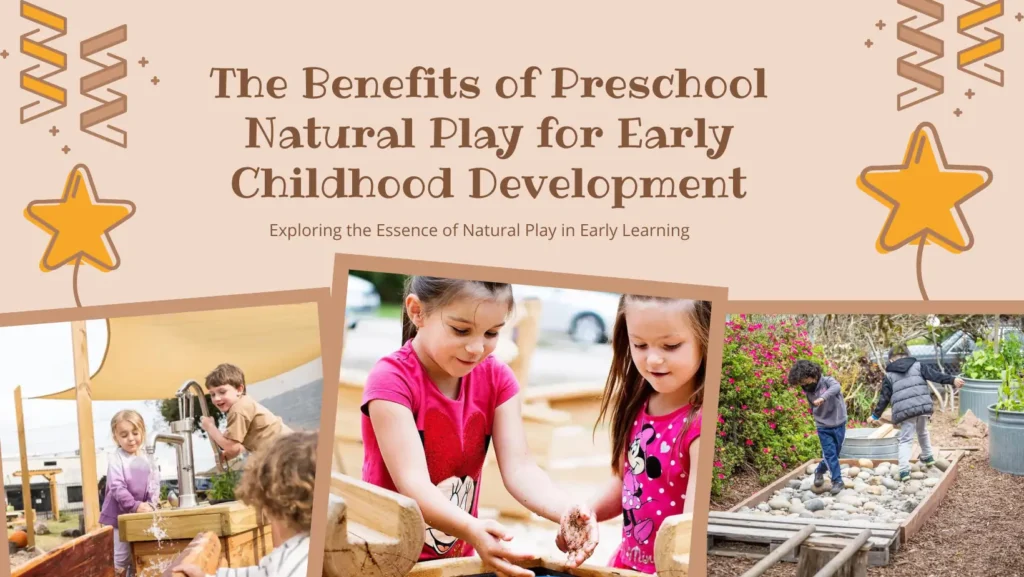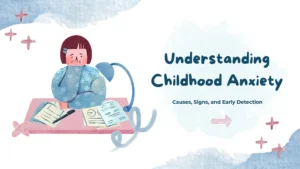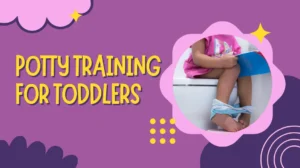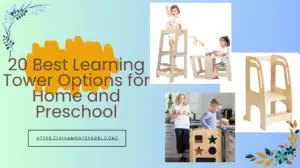As a passionate advocate for early childhood development, I’ve observed firsthand the transformative power of natural play in preschool settings. The question often arises: How significant is preschool natural play benefits for young learners?
Natural play, characterized by activities that engage children with the natural environment, is critical for early childhood development. It fosters creativity, enhances physical health, and supports emotional and social growth. Through hands-on experiences with natural materials, children learn problem-solving skills, develop resilience, and nurture a lifelong connection with nature. Moreover, preschool natural play benefits will encourage children to explore and inquire, laying a solid foundation for academic learning and environmental stewardship.
Understanding the importance of integrating natural play into preschool education is just the beginning. Let’s delve deeper into why this approach is not just beneficial but essential for our children.
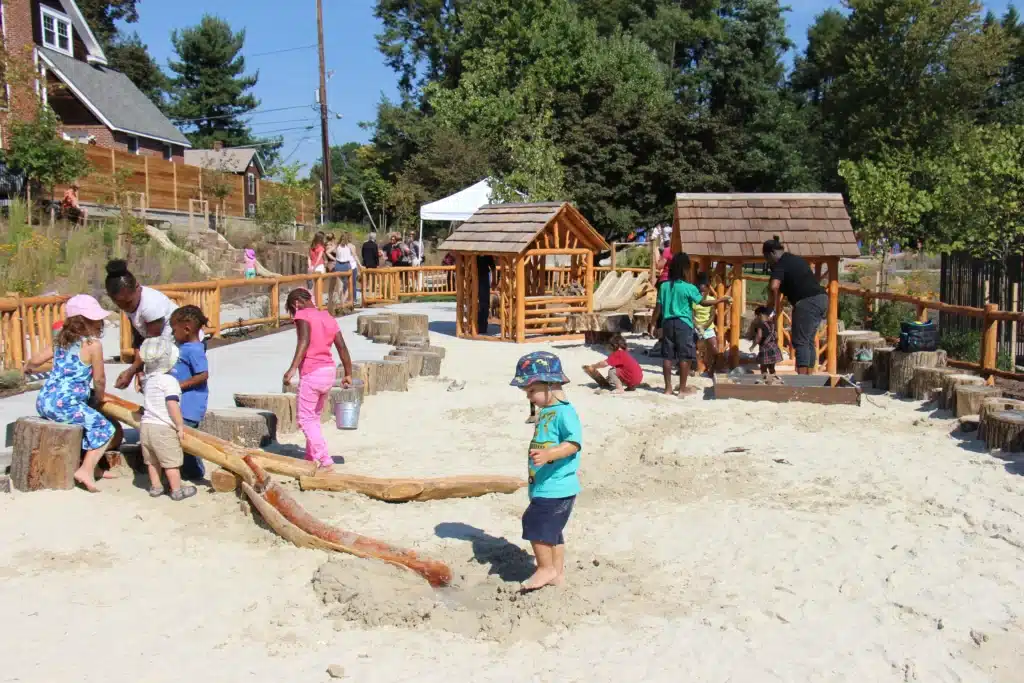
What Is Preschool Natural Play Benefits and Why Does It Matter?
Natural play is a concept that captures the essence of unstructured play in the natural environment. It’s about allowing children to explore, interact with, and learn from the natural world around them. This can include activities like climbing trees, playing with leaves, digging in the dirt, or building with sticks. Unlike structured play, which often involves manufactured toys and specific rules, preschool natural play benefits is open-ended, driven by curiosity, and rooted in the spontaneous interactions children have with their surroundings.
Why does natural play matter? The preschool natural play benefits extends far beyond mere amusement. It plays a crucial role in the holistic development of children. Here are several reasons why natural play is indispensable:
- Promotes Physical Health: Engaging with natural elements encourages physical activity. Climbing, jumping, running, and balancing in natural settings are not only enjoyable but also improve motor skills, physical strength, and overall health.
- Enhances Cognitive Development: The preschool natural play benefits will stimulates children’s cognitive abilities. It encourages problem-solving, creativity, and imagination. Children learn by doing, and the natural world offers endless opportunities for discovery and learning.
- Supports Emotional and Social Growth: Natural environments provide serene and less structured settings where children can explore emotions and relationships. Playing outdoors with peers teaches children about cooperation, negotiation, and conflict resolution.
- Fosters Environmental Stewardship: Early experiences with nature can instill a lifelong appreciation for the environment. Children who engage in natural play are more likely to grow into adults who value and protect natural spaces.
- Improves Attention and Reduces Stress: Studies have shown that spending time in nature can enhance attention spans and reduce symptoms of ADHD. The natural world is also a powerful antidote to stress, offering children a sense of peace and tranquility.
In essence, natural play is a fundamental component of childhood development. It not only supports physical and cognitive growth but also nurtures emotional resilience and a deep-rooted connection to the environment. By prioritizing preschool natural play benefits, we offer children a foundation for healthy development and a pathway to becoming well-rounded, environmentally conscious individuals.
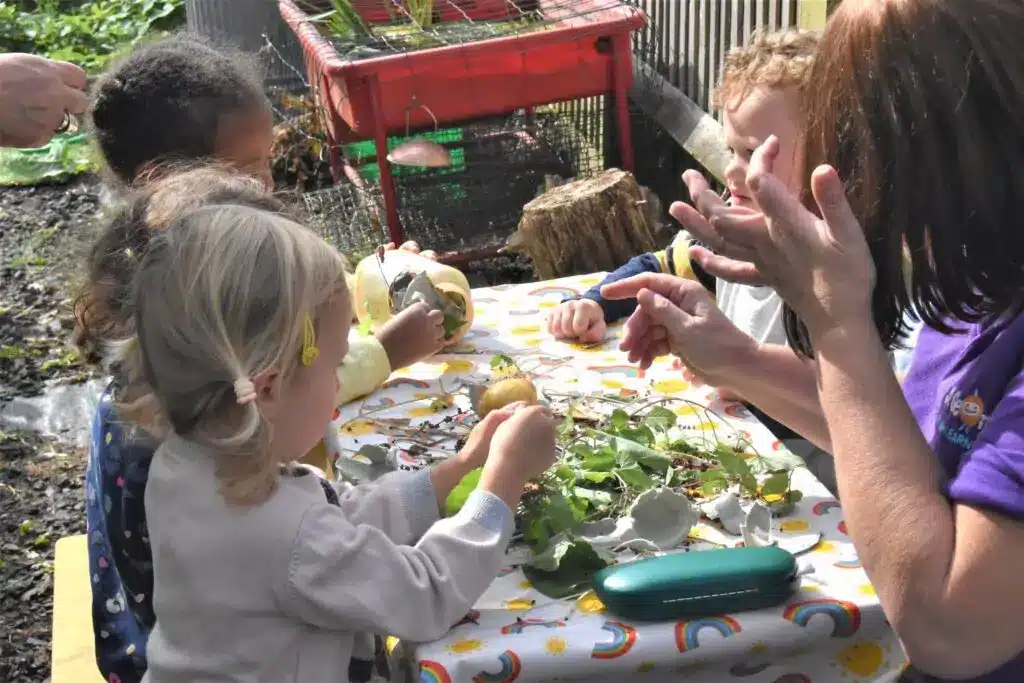
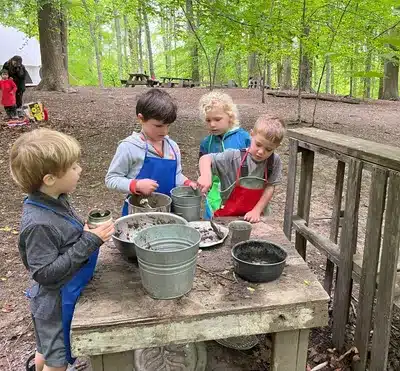
How Can Preschools Design Natural Play Environments to Maximize Preschool Natural Play Benefits for Child Development?
In the quest to support holistic child development, preschools are increasingly turning towards natural play environments. These spaces, grounded in the elements of the natural world, offer a myriad of developmental benefits. They encourage physical activity, stimulate imaginative play, enhance cognitive skills, and promote social interactions among children. Designing such environments requires a thoughtful approach that integrates nature’s diversity and allows children the freedom to explore. Here’s an expanded guide on creating engaging natural play settings in preschools:
Incorporate Diverse Natural Elements: Utilizing a wide range of natural materials—such as sand, water, rocks, logs, and living plants—can transform an ordinary playground into a rich sensory and learning experience. These elements invite children to engage all their senses, fostering a deep connection with nature and stimulating physical coordination and balance.
Design for Exploration and Discovery: Curved pathways, varied landscapes, and hidden areas encourage exploration and adventure. Designing spaces that mimic natural landscapes—like meadows, forests, and streams—can captivate children’s curiosity and encourage them to learn through exploration.
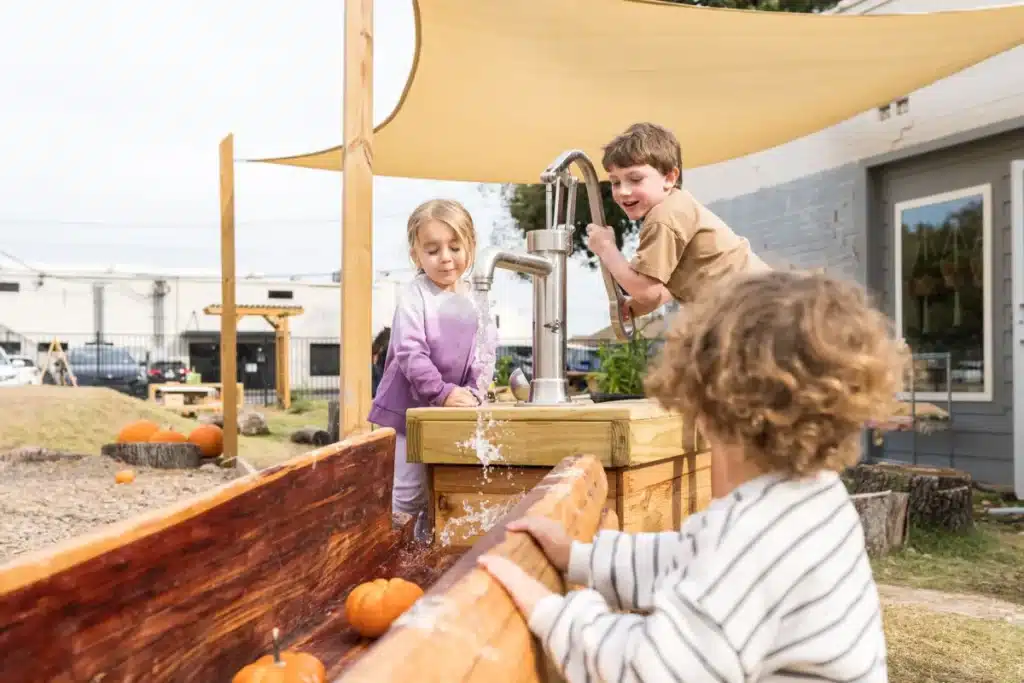
Include Interactive Natural Features: Beyond static natural elements, interactive features like vegetable and flower gardens, sand pits, and water play areas offer hands-on experiences with natural cycles and ecosystems. These features can teach children about the origins of food, the properties of water, and the importance of biodiversity.
Create Spaces for Imaginative Play: Natural settings inherently inspire imaginative play, which is crucial for cognitive development. A fallen tree might become a pirate ship, while a cluster of bushes could turn into a fairy village. These imaginative scenarios encourage creative thinking and language development, as children narrate and negotiate their play scenes.
Ensure Safety While Encouraging Risk: Balancing safety with opportunities for risk-taking is crucial in natural play areas. Features like low climbing walls, gentle slopes for rolling or sliding, and stepping stones offer children chances to test their limits, develop risk assessment skills, and build confidence in their physical abilities.
Foster a Connection with Nature: Integrating educational opportunities about the local environment helps children develop respect and appreciation for nature. This could include labeling plants, creating wildlife habitats, and organizing guided nature walks, which enrich children’s understanding of their world.
Involve the Community: Involving parents, teachers, and local environmental groups in the planning, creation, and upkeep of the play area fosters a collective sense of responsibility and connection to the natural environment. Community involvement also ensures the space meets the needs and reflects the values of the children and families it serves.
Provide for All Seasons: Designing natural play areas to be engaging throughout the year encourages outdoor play regardless of the season. This might include planting seasonal gardens, installing weather-appropriate play structures, and providing shaded or sheltered areas for protection against the elements.
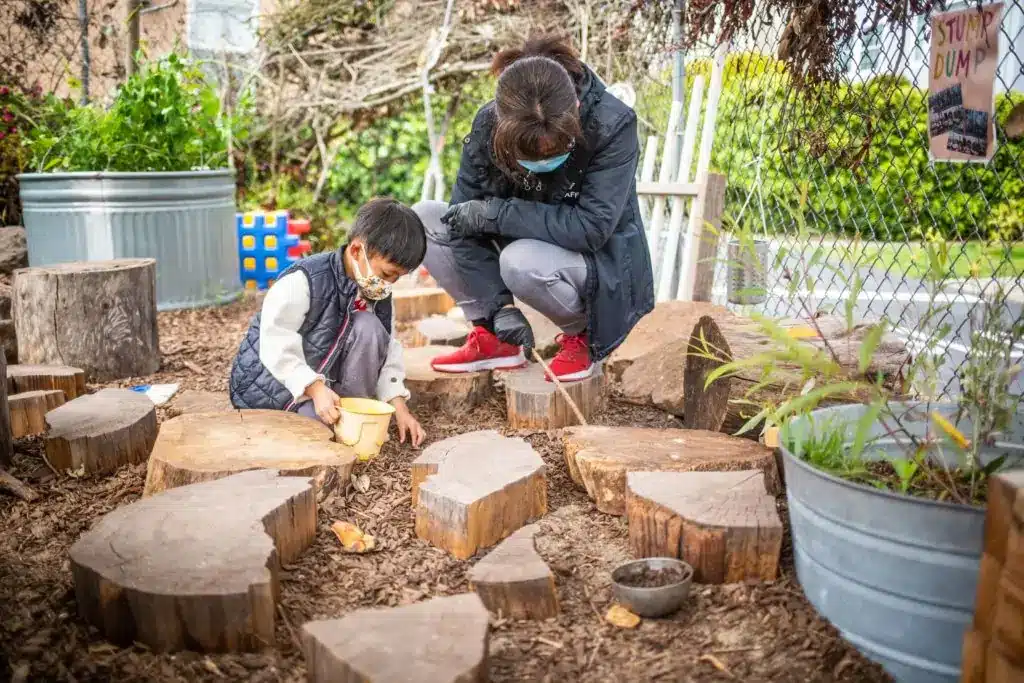
Sustainable Practices: The preschool natural play benefits is Emphasizing sustainability in the design and maintenance teaches children the importance of conservation. Using recycled materials, implementing water conservation practices, and choosing native plants are ways to model environmental stewardship.
By enriching preschool environments with preschool natural play benefits, educators can provide a stimulating backdrop for children’s growth and learning. These environments not only support physical and cognitive development but also cultivate an early appreciation for the beauty and complexity of the natural world.
How Can Preschool Natural Play Benefits Boost Cognitive Skills in Preschoolers?
Natural play stands as a fundamental pillar in the cognitive development of preschoolers, offering a unique blend of challenges and opportunities that traditional playgrounds might not provide. Through the exploration of outdoor environments, children dive into a world where their mental faculties are constantly engaged and nurtured. This engagement with the natural world fosters a variety of cognitive skills critical for early development.
In the realm of natural play, children become keen observers and curious explorers. The diversity of textures, colors, and patterns found in nature stimulates their sensory perceptions, laying the groundwork for cognitive processing and awareness. This sensory input is crucial for brain development, as it helps children make sense of the world around them and understand complex concepts like spatial awareness and cause and effect.
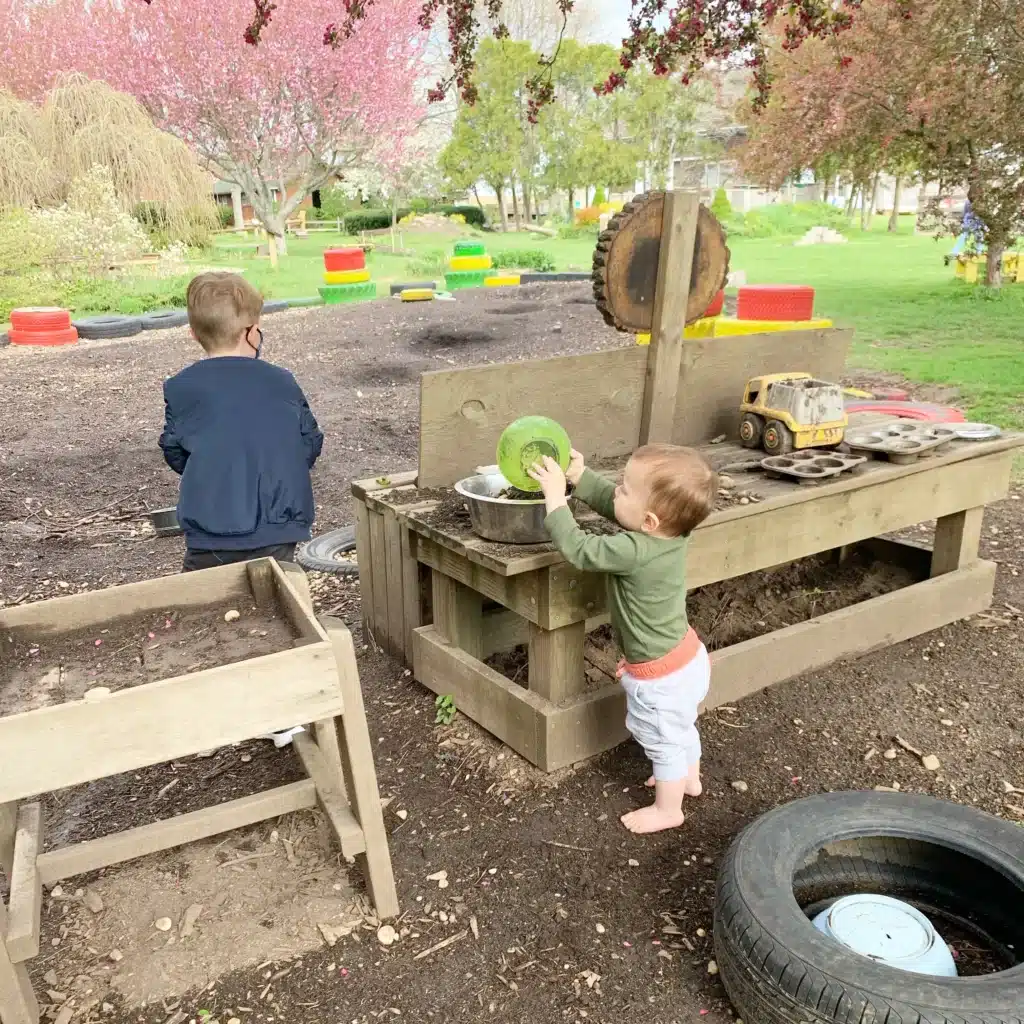
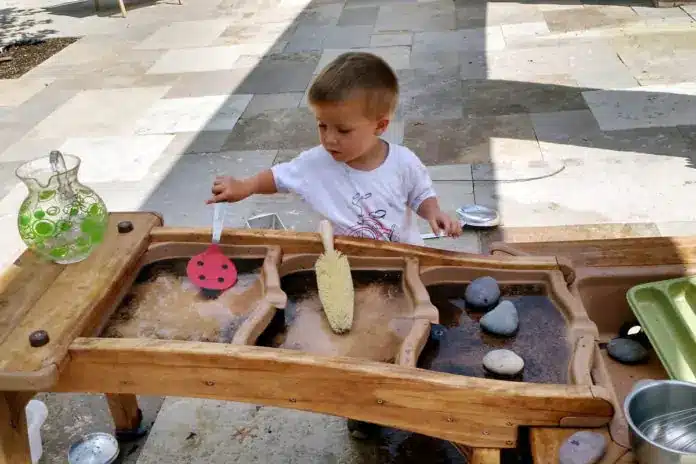
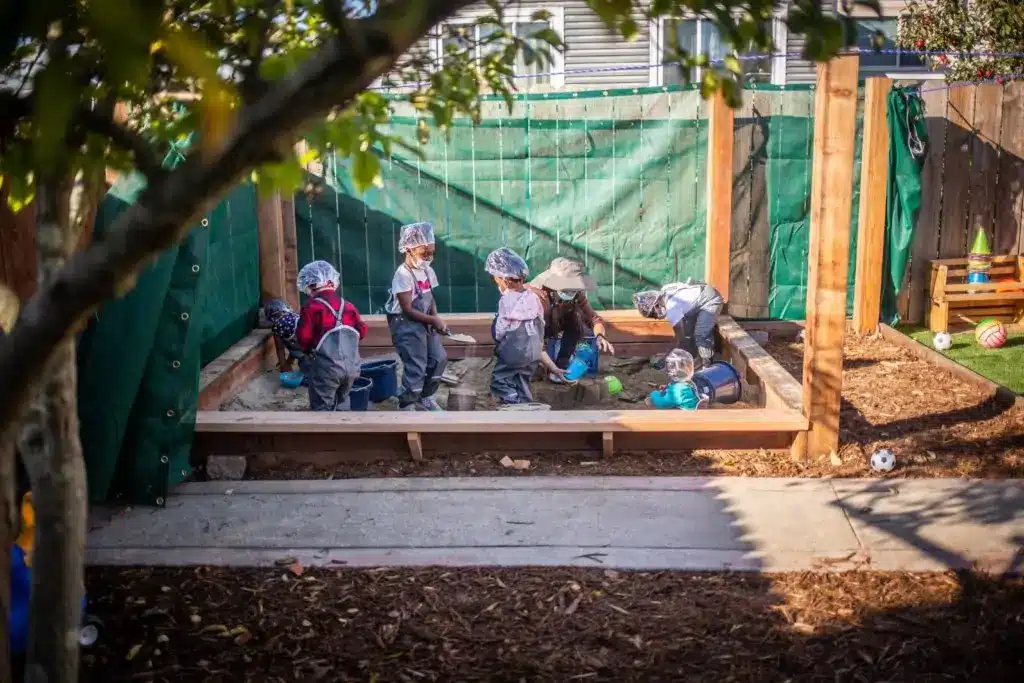
Moreover, natural play environments are rich with unstructured materials that prompt imaginative and creative thinking. A simple stick can transform into a magic wand, a tool, or a piece of art in the hands of a preschooler. This kind of imaginative play not only enhances creativity but also develops problem-solving skills and flexible thinking. Children learn to see objects in numerous ways, a skill that is vital for cognitive flexibility and innovative thinking.
The unpredictable and ever-changing nature of outdoor environments challenges children to adapt and make decisions on the fly. Whether it’s navigating through a wooded area or deciding how to construct a fort with branches, children are constantly making decisions that affect their play. This decision-making process is crucial for developing executive functioning skills, including planning, organizing, and executing tasks.
Social interaction is another preschool natural play benefits. As children come together to explore, they communicate ideas, negotiate roles, and collaborate on projects. This social engagement requires them to process information, understand perspectives, and solve conflicts, which are all essential cognitive skills.
In essence, preschool natural play benefits provides a comprehensive platform for cognitive development. It nurtures a broad spectrum of mental skills from critical thinking and problem-solving to creativity and social cognition. By encouraging children to engage with the natural world, we are not only enhancing their immediate play experience but also laying a solid foundation for their intellectual growth and lifelong learning.
In What Ways Does Preschool Natural Play Benefits Promote a Child’s Connection to the Environment?
The integration of natural play in preschool settings is a profound strategy to connect children with the environment, fostering a relationship that extends far beyond mere appreciation. This connection, nurtured through direct and meaningful engagement with nature, plants the seeds of environmental stewardship, curiosity, and respect that can flourish throughout a child’s life. Here’s an expanded examination of how natural play achieves this:
- Deepening Sensory Connections: Natural play immerses children in a world rich with sensory stimuli. The feel of bark, the sound of rustling leaves, the sight of a butterfly, or the smell of fresh earth all contribute to a multisensory experience that is impossible to replicate indoors. This form of engagement helps children form emotional attachments to their surroundings, making them more likely to cherish and protect the environment as they grow.
- Fostering Environmental Stewardship: Through interactive experiences like gardening, children witness the cycle of growth and the impact of care on the environment. This not only teaches them about the dependence of life on nurturing practices but also instills a sense of responsibility and empowerment. They learn that their actions have a direct effect on the well-being of the planet, encouraging a proactive attitude towards conservation and sustainability.
- Igniting Curiosity and Wonder: The natural world is a vast, open-ended laboratory where children’s questions can lead to discoveries. Why do seasons change? How do insects build their homes? Such inquiries prompted by natural play encourage a deeper investigation into environmental science, fostering a lifelong passion for understanding and preserving the natural world.
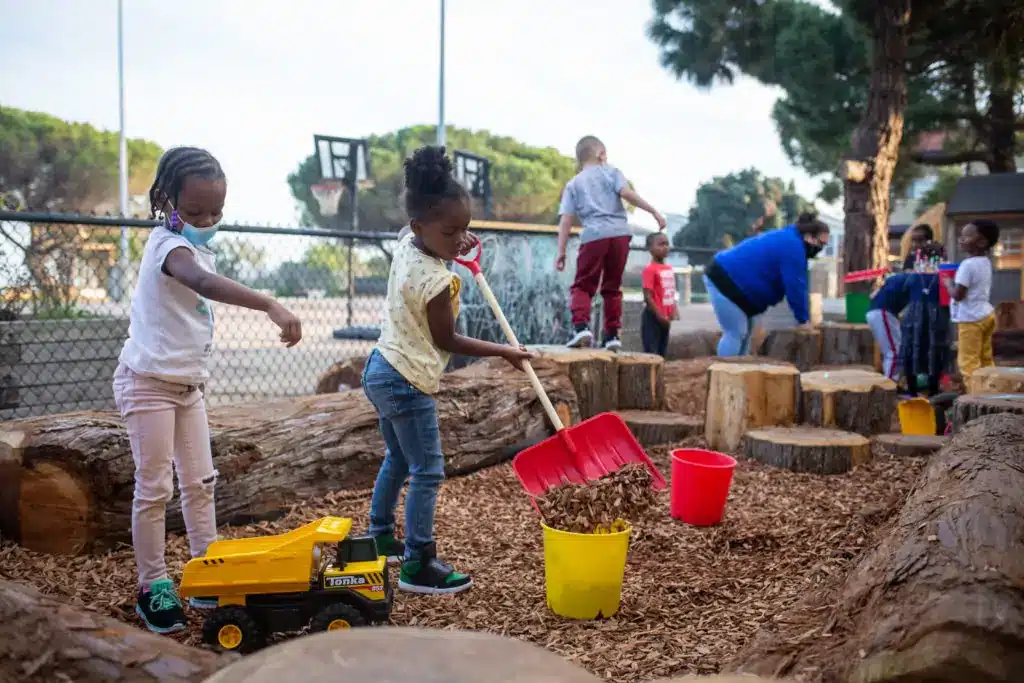
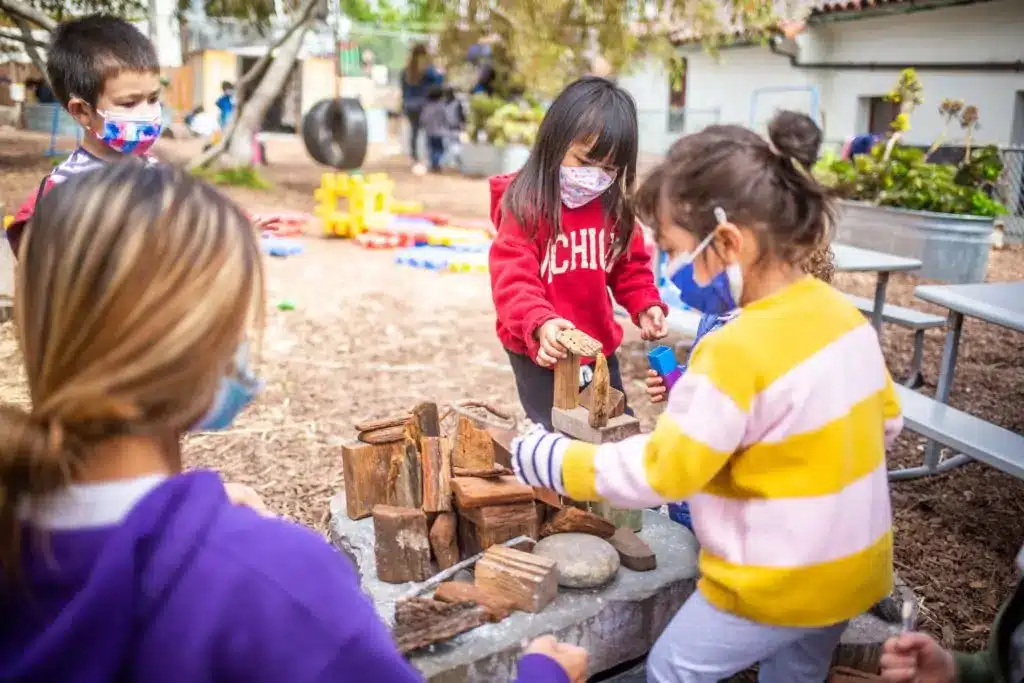
- Cultivating Respect for All Life Forms: Encounters with wildlife, from observing a caterpillar’s transformation to spotting a bird’s nest, teach children about the complexity and value of life. This respect for living things motivates a compassionate approach to human interactions with nature, emphasizing the importance of habitat preservation and biodiversity.
- Promoting Eco-conscious Behaviors: The preschool natural play benefits provides an excellent platform for introducing concepts of recycling, conservation, and sustainability in tangible ways. Whether it’s using rainwater to water plants or repurposing found objects into art, these activities embed eco-friendly practices into children’s daily lives, laying the foundation for responsible environmental behavior as adults.
- Building a Community of Care: Group activities in natural settings, such as clean-up days or community gardening, foster a sense of communal responsibility towards the environment. Children learn that caring for the earth is a shared duty, encouraging collaboration and collective action in environmental preservation efforts.
- Enhancing Physical Health: Beyond the cognitive and emotional benefits, preschool natural play benefitsalso promotes physical well-being. Activities like climbing, running, and jumping in outdoor settings contribute to physical development and encourage a healthy, active lifestyle. This physical engagement with the environment further reinforces the importance of preserving natural spaces for recreational and health benefits.
By preschool natural play benefits, we do more than enrich the immediate play experiences of children; we cultivate environmentally conscious individuals who view themselves as integral parts of the natural world. This early connection to the environment lays the groundwork for a future where individuals not only understand the importance of ecological balance but are also committed to actions that sustain and protect our planet.
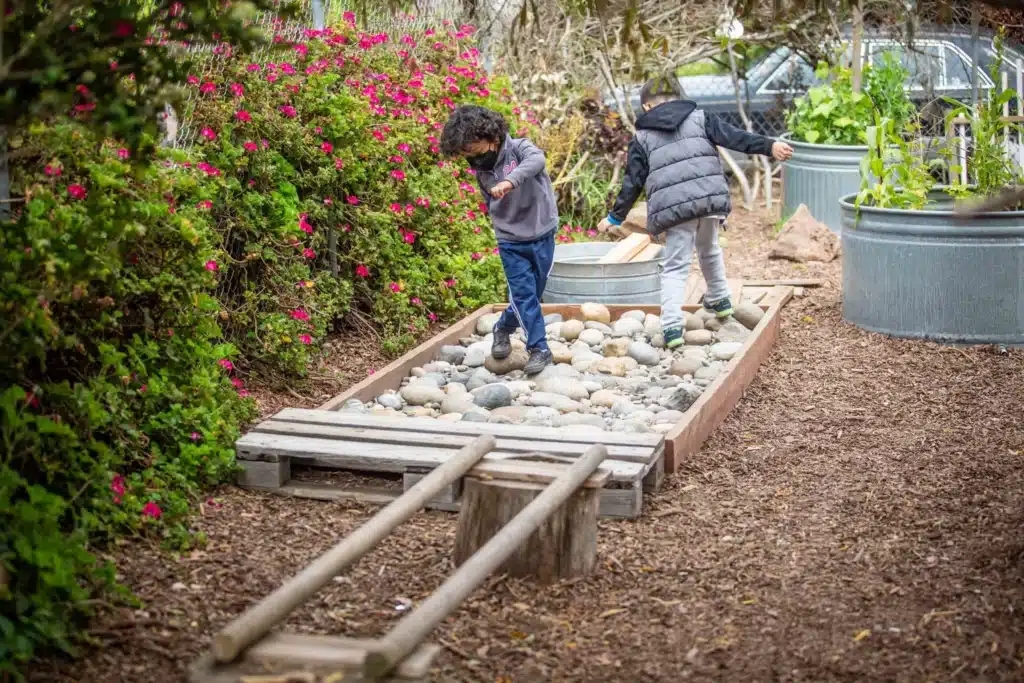
Which Natural Materials and Resources Enhance Preschool Natural Play Benefits?
In the realm of preschool natural play, the choice of materials and resources is crucial for creating enriching and engaging outdoor experiences. The preschool natural play benefits will encourages exploration, creativity, and a deeper connection with the environment. Here are some accessible and effective natural materials and resources that significantly enhance natural play experiences for preschoolers:
Sand and Water: These fundamental elements offer endless possibilities for sensory play, experimentation, and learning about basic scientific concepts like volume, buoyancy, and flow. Sand pits and water tables not only provide tactile experiences but also stimulate imaginative scenarios where children can create, mold, and explore.
Rocks and Pebbles: Small stones and pebbles are perfect for sorting, counting, and pattern-making activities that support early math skills. Larger rocks can serve as natural seating, climbing obstacles, or landmarks within a play landscape, promoting physical activity and spatial awareness.
Logs and Tree Stumps: Logs and stumps can be arranged to create pathways, balance beams, or seating areas. These elements encourage gross motor skills like balancing and jumping and can also be used as props in imaginative play or as tools for learning about the life cycles of trees.
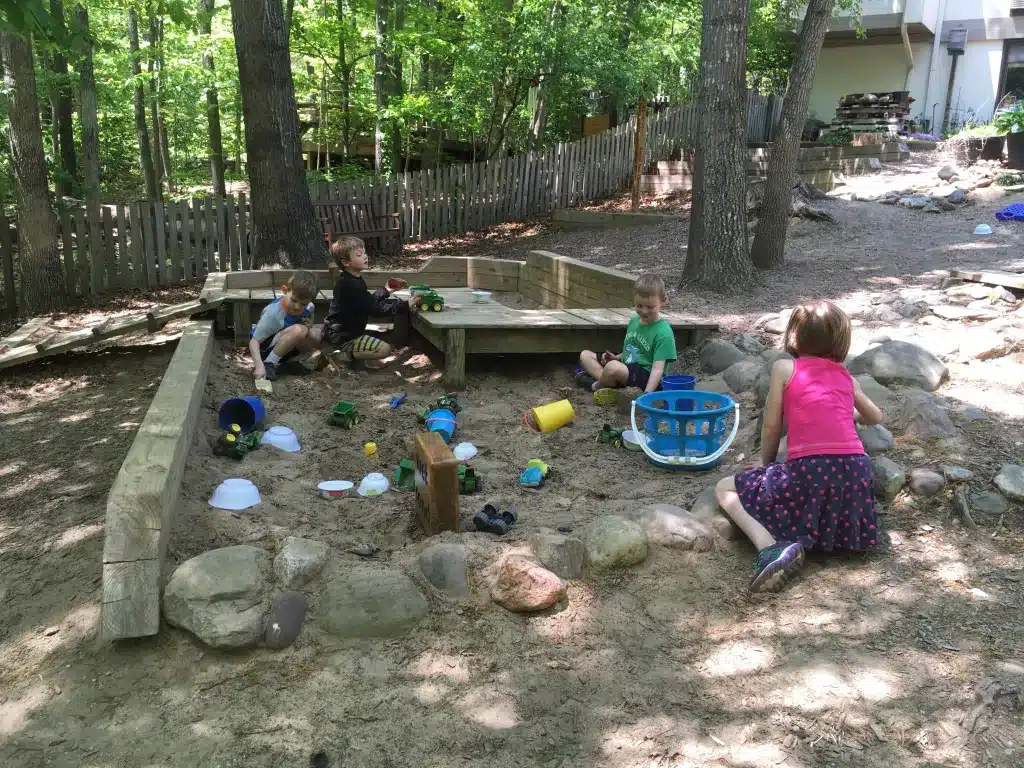
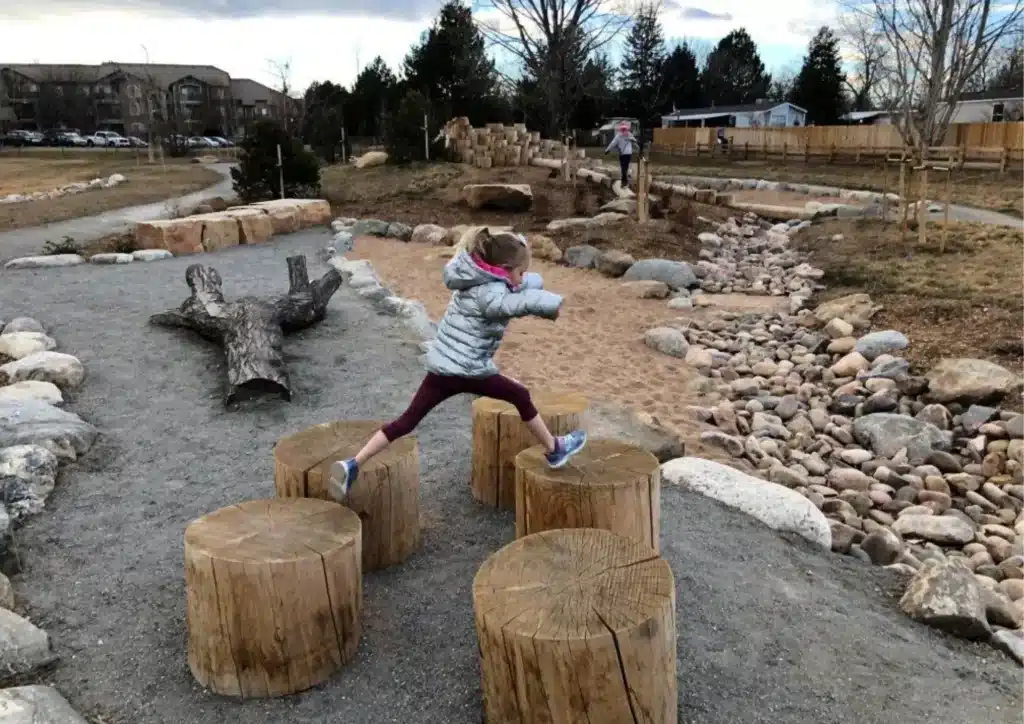
Plants and Gardens: Incorporating a variety of plants, from towering trees to small shrubs and flowers, invites biodiversity and exposes children to the wonders of the natural world. Gardens, whether for flowers or vegetables, offer hands-on experiences with planting, caring for, and understanding the growth cycles of living things.
Leaves, Twigs, and Acorns: These simple, abundant materials can be used for art projects, counting games, or construction materials in miniature building projects. They also provide a direct connection to the seasons, as the types and availability of these materials change throughout the year.
Natural Fibers: Materials like wool, cotton, and bamboo can be used in crafting or as elements in outdoor play kitchens or shops, encouraging imaginative play. These fibers also offer a tactile experience and teach children about different textures and materials found in nature.
Mud: Perhaps one of the most beloved natural materials, mud can be used for making pies, sculptures, or simply for the joy of squishing and feeling. Mud play supports sensory development and can be a prime medium for artistic expression and exploration.
By integrating these natural materials into preschool playgrounds and outdoor play areas, educators and caregivers can create rich, stimulating environments that not only entertain but also educate. These resources foster a hands-on connection to the natural world, encouraging curiosity, respect for nature, and a foundation for environmental stewardship.

How Can Preschools Incorporate Natural Play in Limited Outdoor Spaces?
Even with limited outdoor space, preschools can creatively incorporate natural play elements to enrich children’s learning and play experiences. Natural play doesn’t require vast expanses; it’s about utilizing what you have thoughtfully and inventively. Here are practical ways to integrate natural play into smaller outdoor areas:
Create Vertical Gardens: When ground space is scarce, go vertical. Vertical gardens or green walls can introduce children to the concepts of gardening and plant care without requiring a lot of room. They can observe growth, understand plant needs, and enjoy the sensory benefits of greenery.
Install Miniature Water Features: A small water table or a compact, recirculating waterfall can provide sensory play opportunities. Children can explore water movement, engage in imaginative play, and learn about water cycles in a confined space.
Use Portable Natural Elements: Large planters can house a variety of plants, small trees, or even a mini sandbox. These can be moved around to change the play area’s layout or to make space for other activities. Portable wooden crates can be filled with natural materials like rocks, leaves, and twigs for exploratory play.
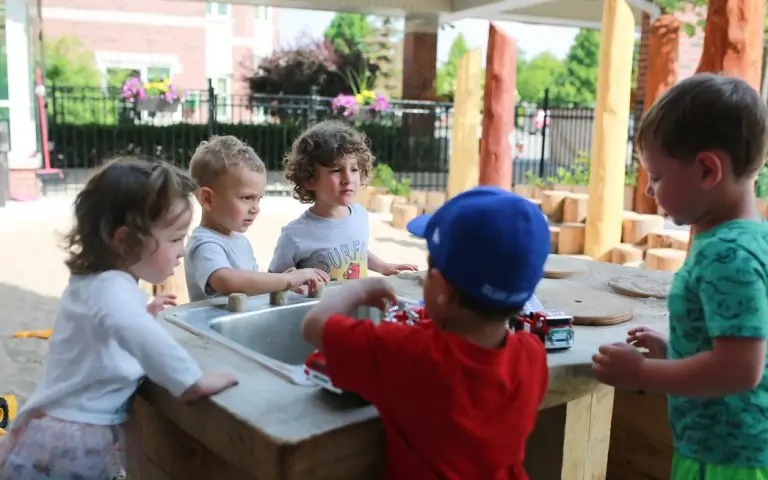
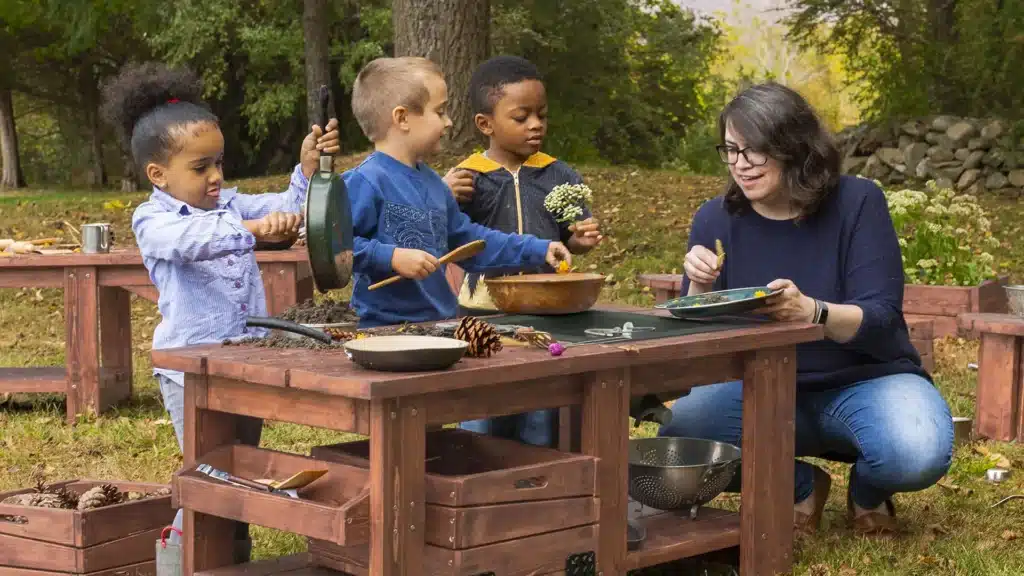
Incorporate Nature-themed Play Equipment: If actual natural elements are hard to come by, consider play equipment that mimics nature. For example, climbing structures that look like trees or rocks, or playground surfacing made from recycled rubber that resembles natural textures.
Create a Sensory Path: A sensory path can be made from different materials such as wood chips, smooth stones, and artificial turf to create varied textures underfoot. This can be a simple way to engage children’s senses and encourage exploration within a limited space.
Introduce Container Gardening: Small, movable containers or raised beds can be used for planting flowers, herbs, or vegetables. This not only brings natural elements into the play area but also teaches children about growing food and caring for the environment.
Use Natural Decoration: Hang wind chimes made from shells or bamboo to add natural sounds to the outdoor area. Decorate fences or walls with children’s artwork inspired by nature, or with natural materials like woven branches or driftwood.
By adopting these strategies, preschools can make the most of limited outdoor spaces, ensuring that children have valuable opportunities for natural play. This not only supports their physical and cognitive development but also fosters a connection with nature, creativity, and a sense of stewardship for the environment.
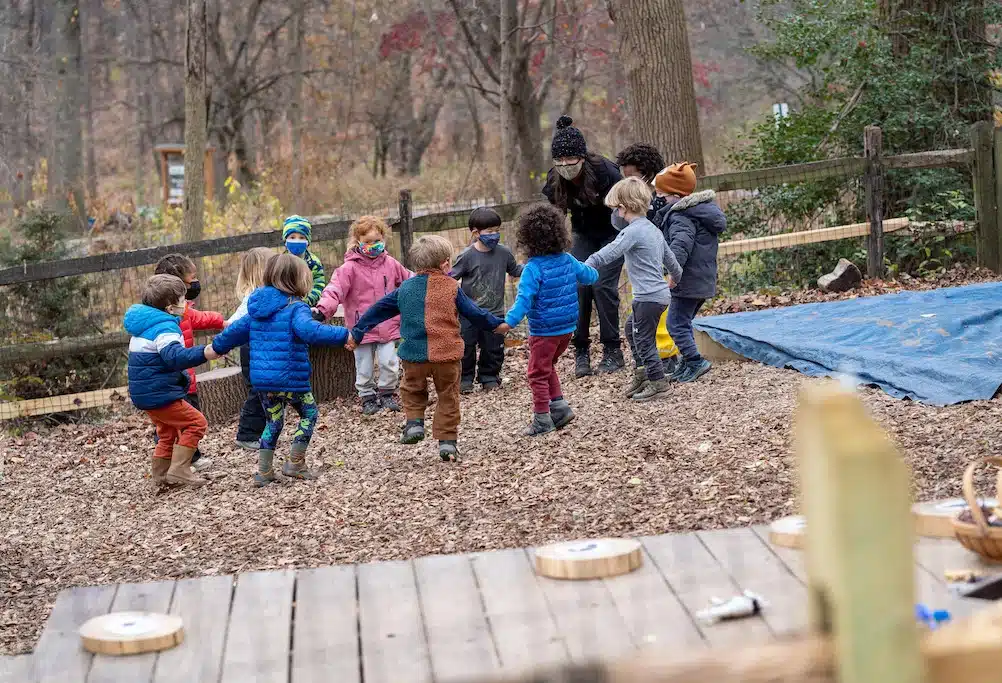
Incorporating natural play into preschool environments offers invaluable benefits for young learners, regardless of the size of the outdoor space. It nurtures their development, sparks their curiosity, and fosters a deep appreciation for the natural world. Creative strategies like vertical gardens, miniature water features, and portable natural elements can transform even the smallest areas into enriching natural play spaces.
These efforts not only enhance children’s play experiences but also promote environmental stewardship from an early age. As we aim to create more meaningful outdoor learning environments, the simplicity of natural play and the profound connections it encourages between children and nature stand out. With thoughtful design and implementation, we can ensure that every child has the chance to explore, learn, and grow in harmony with the environment, overcoming any space limitations.

